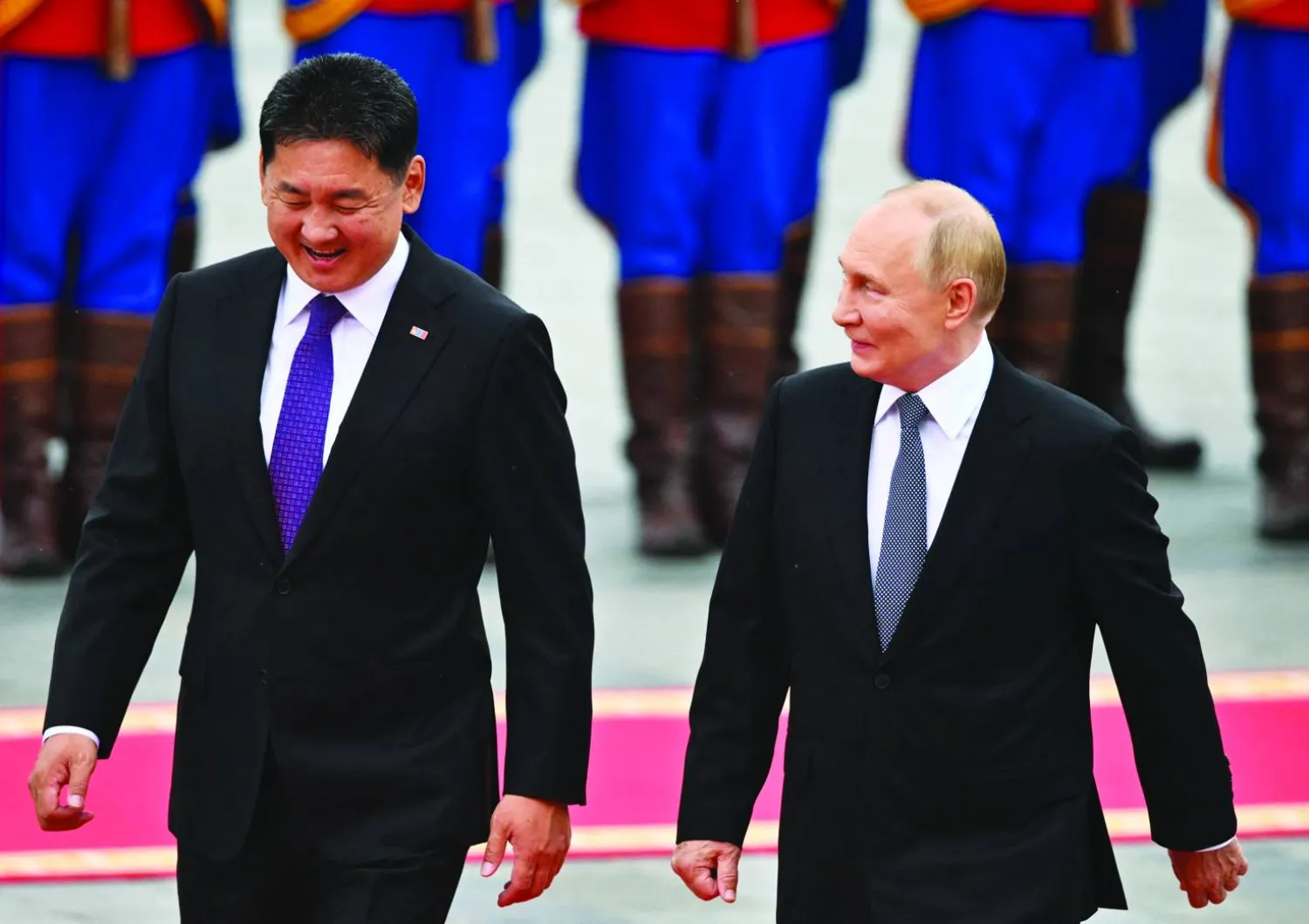Russian President Vladimir Putin received a red carpet welcome on Tuesday on a state visit to Mongolia, whose failure to arrest him under a warrant from the International Criminal Court was criticized by Ukraine as a blow against justice.
As he stepped out of his limousine in the capital Ulaanbaatar, Putin was greeted by his Mongolian counterpart Ukhnaagiin Khurelsukh in front of a row of ceremonial guardsmen on horseback wearing helmets with pointed tops, said Reuters.
The Kremlin leader stooped to kiss a young girl who stepped forward to welcome him in Russian and present him with flowers.
An International Criminal Court arrest warrant issued last year against Putin obliges the court's 124 member states, including Mongolia, to arrest the Russian president and transfer him to The Hague for trial if he sets foot on their territory.
Mongolia's failure to act on it was "a heavy blow to the International Criminal Court and the system of criminal law", Ukrainian Foreign Ministry spokesperson Heorhiy Tykhyi said.
"Mongolia has allowed an accused criminal to evade justice, thereby sharing responsibility for the war crimes," he wrote on the Telegram messaging app. Ukraine, he said, would work with its allies to ensure Mongolia felt the consequences.
The United States, which is not a member of the ICC and is keen to develop relations with Mongolia as an important source of rare-earth minerals needed in high-tech applications, was also critical of Ulaanbaatar.
"We don't believe any country should give Putin a platform to promote his war of aggression against Ukraine," State Department spokesperson Matthew Miller told a regular briefing.
"We do expect Mongolia to adhere to its commitment and support for the principles of the UN Charter, including sovereignty and territorial integrity, and convey that those principles must be upheld around the world," he said.
Miller said Washington understood Mongolia's position sandwiched between two larger neighbors, which are China and Russia, but added; "We do think it's important that they continue to support the rule of law around the world."
While the United States is not an ICC member, it supported the court's decision to issue an arrest warrant for Putin.
The ICC warrant accuses Putin of illegally deporting hundreds of children from Ukraine. The Kremlin has rejected the accusation, saying it is politically motivated.
Kremlin spokesman Dmitry Peskov said last week that Moscow had no worries about any action in connection with the warrant, as Russia had a "great dialogue" with Mongolia and all aspects of the visit had been discussed in advance.
"Relations with Mongolia are among the priorities of our foreign policy in Asia. They have been brought to a high level of comprehensive strategic partnership," Putin told Khurelsukh.
The Mongolian leader said he hoped the visit would boost bilateral trade and economic cooperation.
Mongolia is on the planned route of a major pipeline that Russia wants to construct to carry 50 billion cubic meters of natural gas a year from its Yamal region to China.
The project, Power of Siberia 2, is part of Russia's strategy to compensate for the loss of most of its gas sales in Europe since the start of the Ukraine war. It is the planned successor to an existing pipeline of the same name which already supplies Russian gas to China and is due to reach its planned capacity of 38 billion cubic meters per year in 2025.
The new venture has long been bogged down over key issues such as the pricing of the gas. However, Putin said on the eve of his visit that preparatory work, including feasibility and engineering studies, were proceeding as scheduled.
Putin Gets Lavish Welcome in Mongolia Despite ICC Warrant

In this pool photograph distributed by the Russian state agency Sputnik, Russia's President Vladimir Putin and Mongolia's President Ukhnaagiin Khurelsukh walk past honor guards during an official welcoming ceremony in Ulaanbaatar on September 3, 2024. (Photo by Kristina Kormilitsyna / POOL / AFP)

Putin Gets Lavish Welcome in Mongolia Despite ICC Warrant

In this pool photograph distributed by the Russian state agency Sputnik, Russia's President Vladimir Putin and Mongolia's President Ukhnaagiin Khurelsukh walk past honor guards during an official welcoming ceremony in Ulaanbaatar on September 3, 2024. (Photo by Kristina Kormilitsyna / POOL / AFP)
لم تشترك بعد
انشئ حساباً خاصاً بك لتحصل على أخبار مخصصة لك ولتتمتع بخاصية حفظ المقالات وتتلقى نشراتنا البريدية المتنوعة







